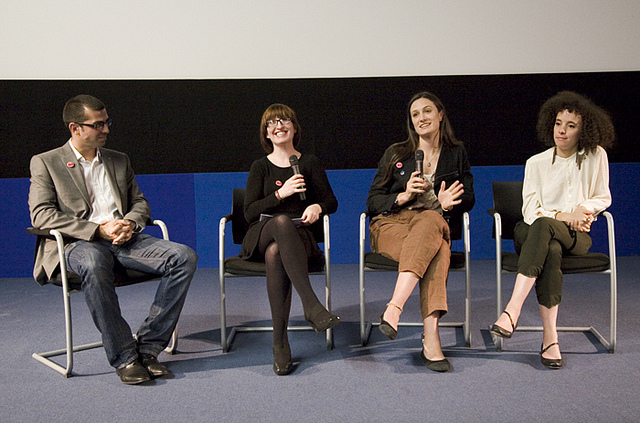
Katherine Fairfax Wright (second to right) and Malika Zouhali-Worrall (right) discuss their documentary Call Me Kuchu at a 2012 screening. (Picture via Niall O’Riordan/Flickr)
Storytelling, along with many other things, has been disrupted—thanks again, Internet. But change isn’t always bad. New technology can lead to innovative ways of telling stories, whether that means using new mediums, new perspectives on well-known topics, or new methods of measuring and extending a story’s impact.
All of the above was on full display on Thursday, January 15th, when Her Girl Friday, an organization whose mission is to foster a community of lady journos and non-fiction storytellers, hosted “Beyond the Screen: Presentations on Innovative and Impact-Focused Documentary Projects.” Five women filmmakers and journos spoke at the Made in NY Media Center about bringing creativity to the field.
Two of the four featured projects focused on measuring social impact and the life of a piece of art or a story after its initial debut. The presentations started with Patricia Finneran and the BritDoc Impact Field Guide & Toolkit. Using the documentary “The Revolutionary Optimists” as an example, Finneran talked about the cycle and steps of the impact guide, and the involvement of the subjects of the documentary in outreach.
The other impact-focused project was Call Me Kuchu, a 2012 documentary that zooms in on the lives and work of LGBTQ activists in Uganda during a time when the government was considering legislation that would make homosexuality punishable by death. Rather than simply creating a feature-length documentary and hoping that the right people would see it, filmmakers Malika Zouhali-Worrall and Katherine Fairfax Wright created short films and other outreach materials based on their reporting that were more digestible and would travel well across the Internet. They also partnered with NGOs and LGBTQ rights organizations with similar missions that agreed to distribute the film. The film was well received, and ultimately, its reach extended far beyond the usual documentary circles. Notably, it was screened for a group of African lawyers at a conference in South Africa and to the UN General Secretary, Ban Ki Moon—two parties who have the ability to positively affect the lives of LGBTQ activists in Uganda.
Of course, innovation isn’t just about measuring a story’s impact and afterlife. Sometimes, it’s about approaching a familiar topic from a different point of entry. Channon Hodge, a video journalist for the New York Times, presented a series she worked on called Off Color. The goal of Off Color is to bring some positivity to the subject of race and report on something other than the oft-seen angle that “it sucks to be a minority.” To that end, Hodge and her partner on the project, Tanzina Vega, worked to change the mood of the conversation by choosing a fresh, innovative perspective: the series profiles comedians and other artists of color who address race in their work through the prism of humor.
Meanwhile, Alyson Martin and Nushin Rashidian, the founders of Cannabis Wire and authors of A New Leaf, turned a graduate school project into a reporting trip that spanned several years and eventually led to a single-subject website, a book, and a news game. When Martin and Rashidian first started in 2009, legalization of marijuana wasn’t really a thing—though there were grassroots efforts in a few states, it was not a topic in the national news cycle. Against the doubts of many, Martin and Rashidian pursued the topic and helped usher cannabis into the national spotlight. Their news game puts the user in the role of the pot grower, forcing them to confront issues of environmental impact, cost, and other business-related skills people don’t normally associate with pot.
You know it’s going to be a good night when the women in the room outnumber the men four to one. Her Girl Friday brought together a tremendous combination of women reaching beyond traditional methods of distribution and storytelling in order to spread the influence of their work. Innovation can mean a lot of things, and these women are working to figure out as many ways to innovate as possible.
·
Kristin Oakley is the editor at large for visual media at The Brooklyn Quarterly. She is currently pursuing her masters degree in digital journalism through Studio 20 at New York University. To learn more about her and see her work, visit kristinoakley.com.
